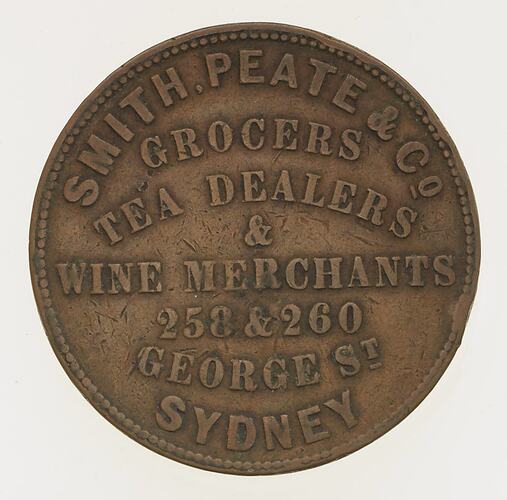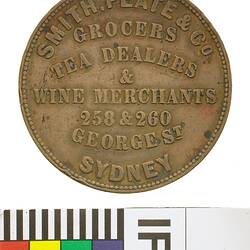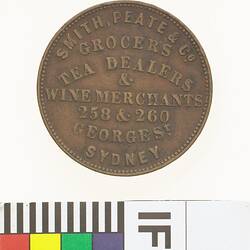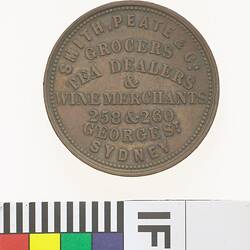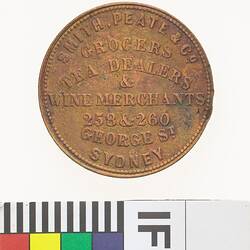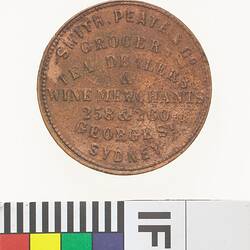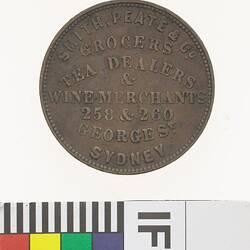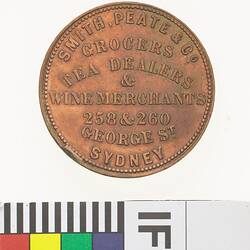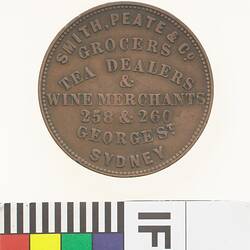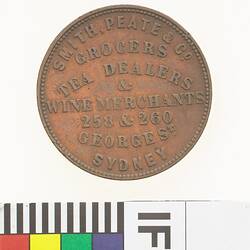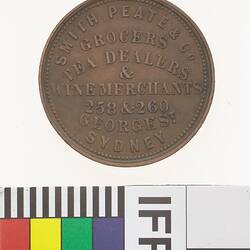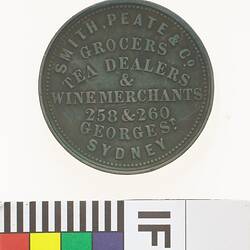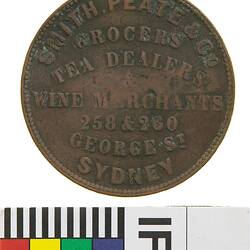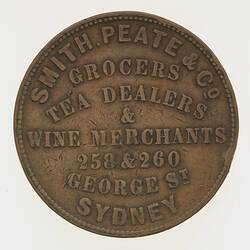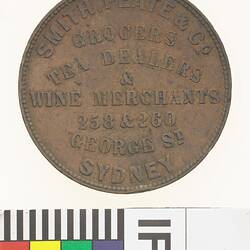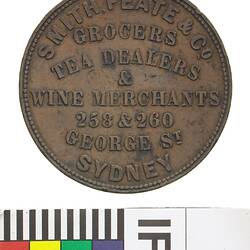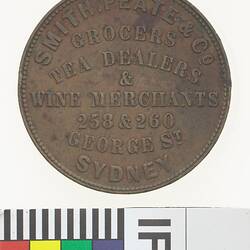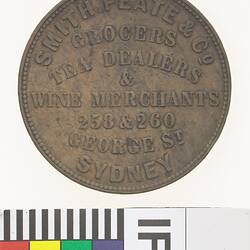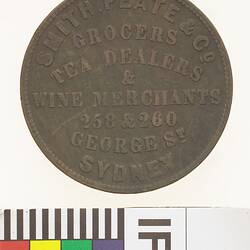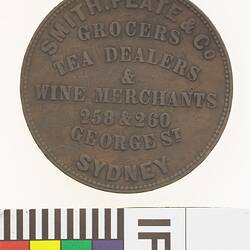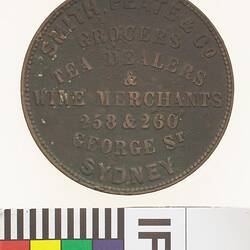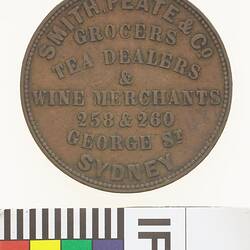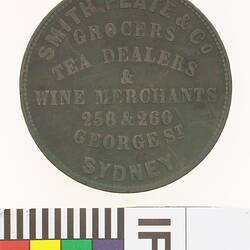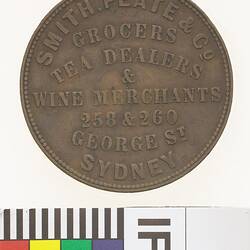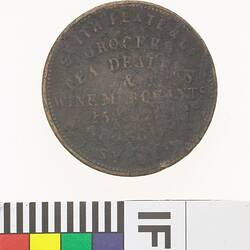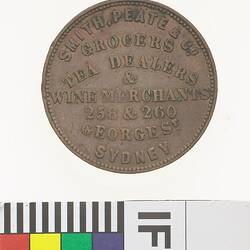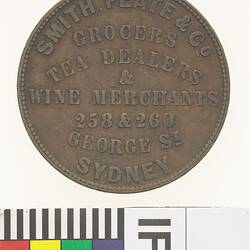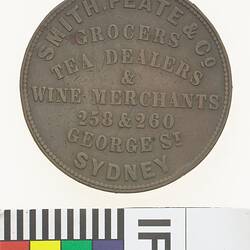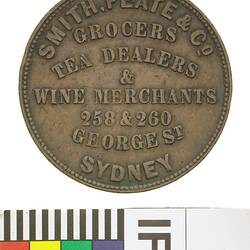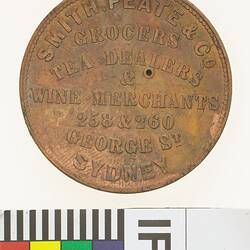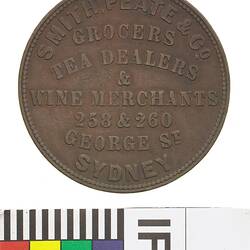The first partnership between these families was from 1820 to 1825 when Captain George Peate and William Smith were the owners of the trading vessel Sally. In 1836 Charles Peate (son of George) opened a grocery store in Prince Street, Newtown. His son Thomas moved the business to 221 George Street East in 1850 and in 1855 he joined with Edward A. Smith (grandson of William) and Alfred Harcourt to form Smith, Peate and Co., Shipping and Family Grocers and Wine Merchants. They later moved and occupied 113-115 George Street, five doors south of Bridge Street, and across the road from the Bank of Australasia.
When the street numbers were re-allocated in 1857, 113-115 became 258-260. These new numbers provide evidence of the date of issue for the tokens, as they are used on the obverse. 'Allowing for the time factor for the order to be fulfilled by Heaton and Sons in Birmingham, the first order of tokens would be unlikely to arrive before 1859.' (May, 1988)
During the 1860s the business did well and claimed the patronage of 'His Excellency, the Governor in Chief.' The business became Peate and Harcourt in 1880.
In 1886 W.H. Peate, son of Thomas, moved the business moved across George Street to a bigger shop at number 225. In 1893 T.J. Turton became a partner in the firm. The Smiths and Harcourt had all retired from the business by this time. The business closed in 1897 and the building was demolished. (May 1988, pp. 21-36)
An example of the Gubernatorial patronage that the company was proud to enjoy is preserved in an advertisement in Waugh's Australian Almanac for 1858. The full page advertisement is surmounted by the colony's crest, with 'Purveyors to his Excellency the Governor General' below it. This advertisement confirms the address for the business after the 1857 re-numbering of George Street. The text describes the business as 'wholesale Shipping & Family Grocers', and 'begs to call the particular attention of PRIVATE FAMILIES, HOTEL KEEPERS and others to the First Rate Assortment of GROCERIES, OIL AND ITALIAN STORES' they offered. An almost identical advertisement was published by Peate & Harcourt, in Bradshaw's Almanac and General Guide for1864. For a copy of these advertisements, see Supplementary File.
In the early 1860s, Smith Peate and Co. continued advertising the range of imported groceries and alcoholic beverages. Two advertisements were current in April and May of 1861, one advertising the span of their trade, and the other dealing with two new lines that they were carrying, Ginger Wine and Elder Wine. In the latter advertisement the partners stated that they 'respectfully solicit a trial,' and expressed their hope that the 'excellence of quality' and 'moderate price' of the wines would 'ensure a large sale.'
Newspaper research indicates that Smith, Peate & Co. were also involved in intercolonial trade. Brisbane's The Courier newspaper for January 24, 1865 included an advertisement for their Sydney shop. Like most businesses who aspired to supply goods to people outside the cities, they included a sentence drawing the attention of country readers to their delivery services: 'Gentlemen and Families in the interior supplied with every article requisite on a station, or for private use, carefully packed, and of superior quality.'
References:
May, T. (1988). 'Tokens of George Street,' Australian Numismatist, (Special Bicentennial Edition), pp.21-36.
Advertisement, Waugh's Australian Almanac for 1858, advertisements section p.22.
Advertisement, The Courier, 24 January 1865, p.4.
Advertisement, Sydney Morning Herald. 11 May 1861, p.3.
Advertisement, Sydney Morning Herald. 13 April 1861, p.6.
Advertisement, Bradshaw's Almanac & General Guide for 1864, Advertisement, Unnumbered page.
More Information
-
Keywords
Trade Tokens, grocery shops, shipping industry, wine merchants
-
Localities
-
Authors
-
Article types
